Jeff Webster was three years old when his birth father was sent to prison. It was left to his mother, a dinner lady, and her new partner, a plasterer, to raise him.
It’s not a typical upbringing for an entrepreneur. To say the least. Yet Webster went on to co-found a startup that’s predicting turnover of £11m this year. Hunter & Gather, a health food and supplement brand, was started in 2017, and it’s only looking back that he realises quite how many obstacles he’s faced. “I’d never realised there was a big difference working class and middle or upper class, but the more we’ve gone along this journey, you can see there is.”
While there’s no doubt that building a successful food and drink brand is a challenge for founders from any background – and that any such success should be celebrated – Lee Elliot Major, the UK’s first professor of social mobility, at the University of Exeter, says that “working-class founders face material and cultural barriers compared with their more privileged peers”.
“They lack, for example, a financial safety net at a precarious time, but also the social networks that can be so critical in any career. There’s also widespread evidence of unconscious class bias when judging people.”
Lateish Drinks/Broken Barrier
Founder: Asher Flowers
Background: Single parent family in The Valleys, South Wales
Startup: Lateish Drinks is a sales & marketing agency for super-premium drinks founded in 2024. Broken Barrier is an infused tequila launching this year.
No of employees: One
Annual sales: pre-revenue
Biggest lesson learned: “Don’t hesitate to seek advice or shy away from sharing your own experiences. I missed out on valuable opportunities by not seeking guidance.”
The numbers back that up. According to Deloitte, by the age of three, poorer children are estimated to be, on average, nine months behind children from more wealthy backgrounds. Meanwhile, 54% of FTSE 100 CEOs, 54% of top journalists and 70% of High Court judges went to private school, compared with 7% of the population. And from 2009 to 2019, 42% of venture capital money went to founders from the same 7%.
The picture is similar in food and drink. A great many brand success stories feature founders who are funded by inherited wealth (via family or selling stakes in other businesses) and/or city connections forged through high-flying graduate careers.
“Consumers don’t really care about the social or ethnic background of owners, but that doesn’t mean we shouldn’t as an industry,” says Sam Akinluyi, managing director of Innocent Drinks and founding partner at Psalt, a startup incubator that helps disadvantaged, primarily black, founders. “I truly believe that consumers and retailers are missing out on amazing products.”
So, what are the biggest barriers to success for founders from working-class backgrounds? And what can be done to make the playing field more equal?
Funding, family, and safety nets
“Food and drink startups are expensive. You need capital,” says Amy Thorne, founder of food marketing agency Taste. “Without the means to secure funding or the safety net of savings or familial support, the road ahead can seem insurmountable.”
In January 2022, startup incubator Mission Ventures conducted research with the founders of 50 fmcg businesses under five years old. Seventy per cent of these SMEs spent up to £20,000 in the first year, and the source of this funding is telling: 55% of founders used personal savings; 17% used friends and family loans; and 12% received friends and family investments.
Similarly, a 2021 report by angel network Cornerstone Partners surveyed 696 UK companies that had raised VC funding. It found that 72% of the founders attended top tier universities, while 74% came from advantaged backgrounds, with parents in managerial and professional roles.
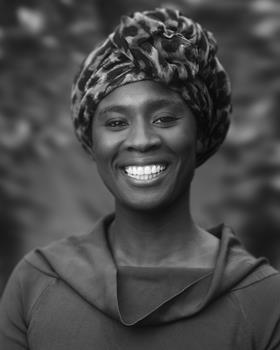
Mama Dolce
Founder: Jane Visram
Background: Shepherd’s Bush, London
Startup: Mama Dolce plant-based ice cream was founded in 2021.
No of employees: Three (plus freelancers)
Annual sales:£150k
Biggest lesson learned: “Good leadership is not only understanding the team, but giving them the ability to stretch themselves and the business in the process.”
This is unsurprising, says Rosalind Goates, head of advocacy and campaigns at The Social Mobility Foundation: “Where you grew up, went to school and your parents’ occupation, sadly, makes a difference. Working-class entrepreneurs can’t ask family members for seed funding or loans. Investors will miss out if they fail to see that talent is everywhere, but opportunity is not.”
The challenge of raising capital is one Webster remembers well. “We spoke to so many VCs, we had a financial advisor working on our behalf from a very well-known institution, and we felt like we weren’t taken seriously. The VCs all felt the same, they all spoke the same, they all felt like they didn’t really care.”
Hunter & Gather did eventually secure “significant investment”, but it came from “two South African guys from working-class backgrounds who built their own fortunes”, Webster reveals. “They just get it.”
Jane Visram is the founder of Mama Dolce plant-based ice cream and a daughter of “hardworking, first-generation immigrants”. She qualified for free school meals as a child (another key indicator of low socio-economic status) and thinks her background affected the outcomes of meetings with funders, retailers and others. “We’ve been successful in accelerators that are specifically targeted at increasing representation in the industry (Psalt, BEO in partnership with Sky, Pinterest Black Gold, to name a few) and long may these continue,” she says. “The business was launched in 2021 with help from a successful reward-based crowdfunding campaign. I would have found it very difficult to start the business without this initial injection of cash.”
Of course, securing capital is just the beginning. Further on, practical hurdles such as storage, production costs and marketing can quickly drain resources.
“The most challenging thing in our business journey has been going into rooms and feeling comfortable”
Mark Gevaux from Hornchurch in Essex became a qualified butcher at 14 and has spent almost two decades building his business. The Rib Man, as he’s known, runs a street food stall on London’s Brick Lane every Sunday, but now makes 80% of his income from selling about 2,000 bottles of his homemade hot sauces every month direct to consumer.
“I didn’t have the bank of mum and dad to fall back on, and it was very stressful, very hard,” he remembers. “Winning competitions like Wing Fest [in 2021] is the kind of publicity I thrive on, because I don’t spend money on marketing – I can’t.”
Webster, meanwhile, remembers “sitting there watching a six-hour YouTube video on how to build a website. And then building our website. We couldn’t pay someone 20 grand to do that for us.”
Kate Johnson, head of recruitment at fmcg startup consultancy YF, agrees that “the barriers differ at each stage of a business’s life… In such a competitive space, of course it helps to know people who can open doors. Though financial and social capital only get you so far – there’s no easy ride.”
Who’s in your ‘circle’?
But ‘the bank of mum and dad’ is not just about being gifted £50k to get a business going – it can be far more subtle. It might be living rent-free for a while, perhaps near central London with easier (and cheaper) access to meetings. It can be the ability to take greater risks, knowing that a period of low or no income can be cushioned by small instances of financial ‘help’. In their book, The Class Ceiling: Why it Pays to be Privileged, Sam Friedman and Daniel Laurison describe such patronage as “a pivotal early career lubricant”.
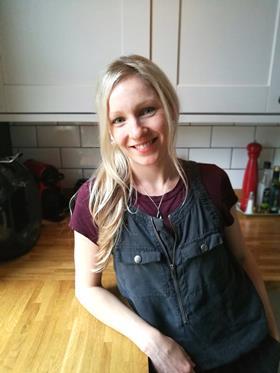
Paleo Foods Co
Founder: Claire Dinsmore
Background: Grew up in social housing with single mum in County Down, NI
Startup: A grain-free granola company Paleo was founded in 2013 with just a loan.
No of employees: Three
Annual sales:£1.5m
Biggest lesson learned: “You can achieve growth and develop your business without investors – but it’s not something you hear about because it’s not as exciting. You don’t have to give away half your business to have one.”
“The most challenging thing in our business journey has been going into rooms and feeling comfortable”
“Where you grew up, went to school and your parents’ occupation, sadly, makes a difference”
And it’s not just about money. Those from middle- or upper-class backgrounds are also more likely to enjoy ‘social capital’. This means having friends, parents or family members who have people in their ‘circle’ who can help in some way – perhaps via contacts, introductions, advice, or other means.
Needless to say, that’s less likely to be present for founders such as Gevaux, who got his first job aged eight and comes from a background where “there weren’t any opportunities for us to go to university”.
He believes “connections are the most important thing” for founders. Visram agrees. “Social capital can be where the real advantage lies. Introductions to buyers that might take an entrepreneur with no connections years to amass can be secured with one or two phone calls if you have the right network.”
“Social capital allows you to get you in the room,” says Akinluyi. “If you’re several degrees of separation away from resource or opportunity, you won’t even know who to talk to. Or, just as importantly, how to talk to them.”

The Rib Man
Founder: Mark Gevaux
Background: Hornchurch, Essex
Startup: The Rib Man started in 2005, selling street food rib sandwiches and his range of homemade hot sauces.
No of employees: One
Annual sales:£250k
Biggest lesson learned: “It’s something I had to learn since losing my leg: adapt and overcome. That saved my business on more than one occasion: Covid, energy prices, recessions.”
Fiona Fitzpatrick, founder of the Brand Growth Heroes podcast, says: “Venturing out to contact people you don’t know is always a bit daunting, yet many manage it thanks to a different kind of privilege: an upbringing that instilled a belief strangers will listen.”
Even if working-class founders manage to get ‘in the room’, a further hurdle can await: confidence and belonging. “If I’m honest, that’s probably been the most challenging thing in our business journey: going into rooms and feeling comfortable,” says Webster.
“There are certain food networking groups that feel like they’re very much private schoolboy and schoolgirl territory. We’ve never felt embraced by them, even though our business is very successful compared to a lot of their brands.”
“Where you grew up, went to school and your parents’ occupation, sadly, makes a difference”
In meetings and networking situations, the ability to project confidence and relate to others can be paramount in building rapport. The word ‘polish’ is used frequently in social mobility circles and by businesses themselves. Polish is often used ambiguously, but when decoded it includes standards around speech, appearance, and etiquette – basically, whether someone ‘looks and sounds the part’.
Webster recalls a conversation with a friend from a privileged background: “He told me that at private school they get taught to bullshit their way through things. He said if there’s one thing you take from that education system, it’s that you literally get taught to be confident no matter what situation.”
Worse, it’s not just what you say in meetings and at networking events, but how you say it. Devyani Sharma, a professor of linguistics and expert in accent bias at Queen Mary University London, says that “because accents are often linked to specific regions, cultures, and social classes, they tend to trigger social stereotypes”.
“These ‘shortcuts’ can lead to active discrimination if left unchecked… These issues are particularly relevant in professional contexts where accent bias may impact perceptions of suitability or competence.”
When asked if he ever felt accent bias, Webster replies: “Absolutely. And location bias, 100%. As soon as you say you’re out in Essex, you see a change. I’ve felt like a sore thumb sticking out because of the way I speak, the way I hold myself.”
Even such a fiercely independent and proudly working-class founder as Gevaux admits he “never had the confidence to bottle my sauce and sell it” for a long time. It was only when food writer Helen Graves tasted it and suggested he do so that Gevaux took the plunge.
Webster feels there’s “a massive mindset piece in there for kids from working-class systems”. He recalls having a job selling kitchens in B&Q prior to going to university and his grandmother asking: “‘What’s he going to uni for? He’s got a great little job there.’ It’s like, all that glamorous stuff, that big stuff – that’s for the others, you leave that to them,” he says. “There’s almost an inferiority complex drummed into you. I’ve had that so much throughout this journey – feeling inferior and imposter syndrome.”
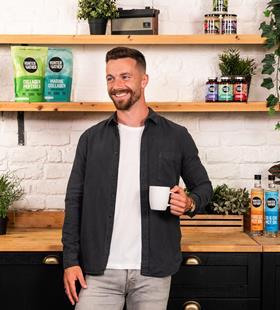
Hunter & Gather
Founder: Jeff Webster (and Amy Moring)
Background: Dagenham, Essex
Startup: Hunter & Gather was founded in 2017 and sells condiments, oils, dressings and supplements.
No of employees: 19
Annual sales:£6.5m in 2023. Projected £11m in 2024
Biggest lesson learned: “I have three: Not to think a deal is done until it’s signed; there’s no silver bullet; little by little, a little becomes a lot.”
A taboo topic
With the disadvantages ranging from the overt to the insidious, it can be difficult to pinpoint effective help. Greater government support through means-tested loans or grants, entrepreneurship education, and more incubator schemes that focus on diversity and inclusion, such as The Co-op’s The Apiary scheme, would be a start. After all, Visram points out that Mama Dolce found success mainly through incubators that have the specific aim of increasing representation.
Both Thorne and Fitzpatrick suggest that mentorship is key, with the latter pointing out many experienced founders already giving their time for free through organisations such as Enterprise Nation and Virgin Startups, though she admits they “are not necessarily food & bev-specific” and are limited in how many businesses they can help. “There’s an opportunity to create an industry-specific organisation that matches mentors to founders in need of support,” Fitzpatrick adds.
Louis Bedwell of Mission Ventures, however, says many “founders, primarily black-owned businesses, tell us they’re over-mentored and under-funded”.
What’s really needed are “dedicated programmes with routes to market and funding attached”.
Read more:
Additionally, ensuring that incubators, VCs and other industry players do not subconsciously discriminate based on accent, ‘polish’, or other hidden measures will be key. Major suggests this will require a wholesale change in the way class is interrogated in the UK, where it has almost become a dirty word.
“Socioeconomic background remains a taboo topic for many – but we know it’s the biggest factor driving outcomes in education, work, and life more generally,” he says. “Do we need to talk about class more? Yes. A national conversation is long overdue.”
Webster also thinks the answers lie deeper than incubators and industry programmes.
“I think back to school and being exposed to people like me, who have changed the trajectory as it were, would have been massive,” he says. “It goes right back to raising awareness that the way we talk and where we come from doesn’t impact our intelligence, our drive, or the substance of what we’re actually doing. Who knows how many people have been in a similar position to me and that attitude has held them back.”
‘Where I’m from, people earn £20k a year. They do not invest £20k a year’
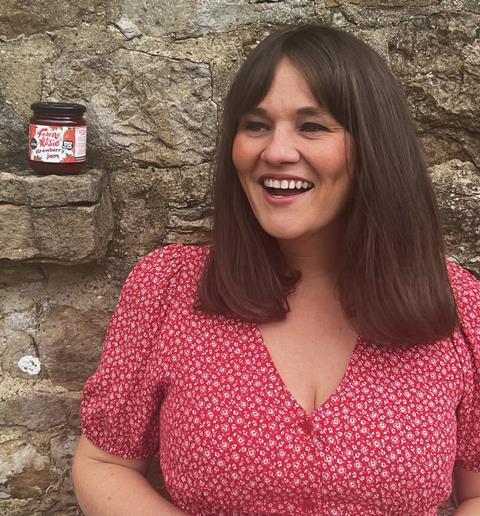
Fearne & Rosie founder Rachel Kettlewell on being a founder from a less privileged background
I’m often asked: Are you surprised by Fearne & Rosie’s success? And no, I’m not really. I always thought it was a good idea. What I am surprised by is the fact that my ordinary upbringing and location have made founding a business much more challenging.
This is an industry renowned for friends and family rounds, big budgets and the fabled ‘overnight success’. But where I’m from, people earn £20k a year. They do not invest £20k a year.
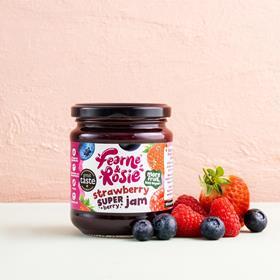
I grew up in Manchester. I’m the oldest of four, had a paper round at age 12 and my first job at 14. I worked to pay my way through uni and was a teacher before starting Fearne & Rosie. I have a northern accent, I’m dyslexic, fumble my words and stand out like a sore thumb at London industry events. Or that’s how I feel, at least.
When I started out, I was being asked to submit financial projections, but I had no idea whether the business would even be here in six months, because I didn’t have the funds behind me to ride any waves. I frequently hear how founders didn’t take a salary for the first year or two. I simply couldn’t do that – and nor could most of the UK population.
I sit in meetings with retailers and worry that I don’t have the vocabulary or private school polish to convince them my brand deserves space on their shelves. Dyslexia means my auditory processing is poor, which means it takes me longer to respond to complex information. I often think I don’t deserve to be there. Plus, I don’t have millions in the bank, so I’m a bigger risk than a better-backed business.
But if we continue to back bigger businesses or brands built by wealthy founders, how can we truly begin to drive change?
Investment is key. It’s the time and experience of those who have been there before. It’s the opportunity to take some precious space on a retailer’s shelf. It’s flexibility on payment.
We need to champion diversity and inclusion. I know there’s appetite within the industry, but we need to move at a faster pace.


